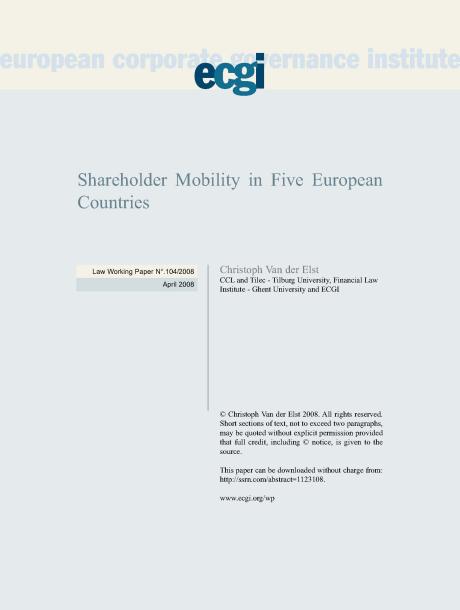
Shareholder Mobility in Five European Countries
Abstract
This paper provides new evidence on the evolution of ownership of a large sample of companies in five European countries - Belgium, France, Italy, Spain and the UK - between 1999 and 2008 to understand ownership dynamics and the influence of legal developments on ownership patterns. Ownership concentration decreased at a moderate pace over the last 8 years in three countries - France, Italy and Belgium - but increased in two others, Spain and the UK. In France, Italy and Belgium approximately half of the companies have a de jure controlling shareholder. In Spain and the UK the largest group of companies have a shareholder with a voting block between 10% and 30%. In all civil law countries in this study, the majority of the largest shareholders are families or non-financial companies. However there are large differences between the civil law countries as well as over time. Banks remained major shareholders in a large number of Spanish companies and acquired smaller blocks in British companies. All over Europe, there is evidence that insurance companies acquire large stakes, though not controlling voting blocks. In France and Italy privatisation processes continue and the number of companies with government shareholdership is reduced. In all countries more companies are confronted with foreign shareholders. Foreign shareholders are the largest group of shareholders, measured by the number of companies in which a shareholder class is present in all countries, with Spain as the only exception.
The analysis of ownership structures enables a more detailed analysis of its relationship with company and securities law. Lele and Siems (2008) developed the LLSV's index of investor protection rights in two indices relating to the protection against board and management on the one hand and protection against other shareholders on the other hand. Their analysis is used to study the relationship between company and securities law development and ownership structures. The results by and large confirm LLSV's thesis, especially for France, though the relationships are relatively weak. The increase of the anti-director index resulted in smaller voting blocks in hands of the largest shareholder. As the anti-blockholder index did not improve in France, (other minority)shareholders increased their voting blocks as a second best substitute.









